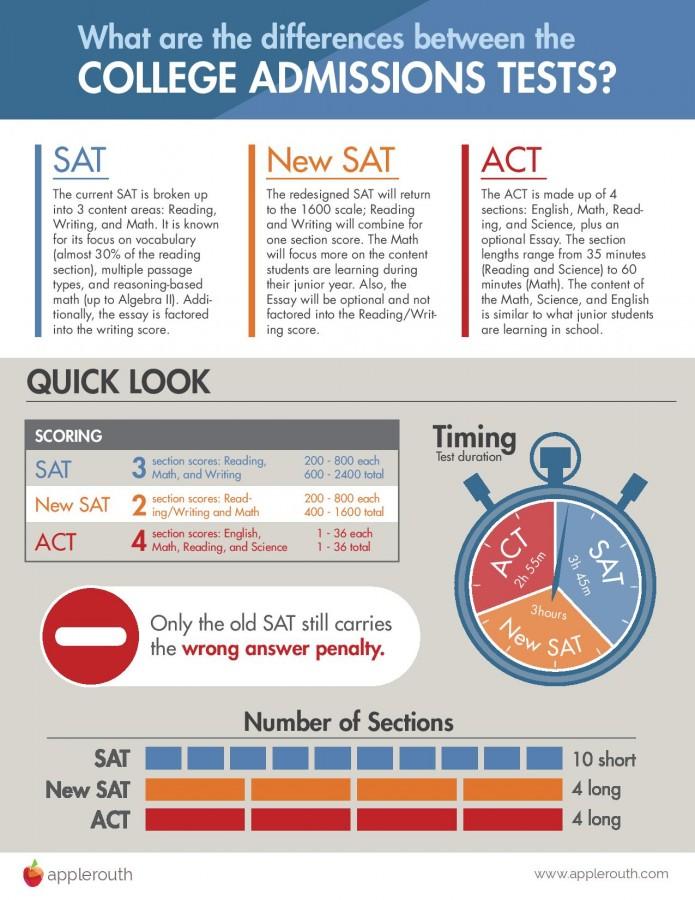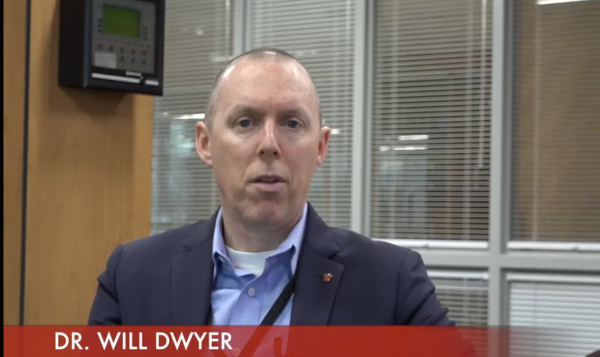Illinois switches from ACT to SAT, DHS working through transition
The State Board of Education announced a switch in the statewide test to the SAT, raising questions of the impact on the Deerfield community
Junior year is characterized by a hectic schedule, time-consuming extracurriculars and the beginning of the grueling college search process. Traditionally, juniors have to focus on getting good grades and a high score on the ACT. However, this is about to change, as the Illinois State Board of Education recently announced that the state standardized test will now be the SAT. The graduating class of 2017 will be the last class to have the mandated ACT. This statewide switch from ACT to the SAT forebodes a major change for teachers, tutors and students alike.
While the new SAT is somewhat similar to the former mandated test of 15 years, there are differences that will need to be addressed. In terms of length, SAT is three hours long, making it only five minutes longer than the ACT. Additionally, the newer SAT does not penalize for guessing, much like the ACT. Most of the differences of the old SAT were shifted to be more similar to the ACT, to appeal to test takers. The most drastic change is the elimination of the guessing penalty on the SAT, along with small changes, such as time and the new calculator portion of the math test. Junior Jordan McElligott has taken both tests and sees major differences among the two, ultimately sharing that she prefers the SAT.
“I liked the SAT better because it was more word-oriented … the ACT is more inferring things from passages, and the SAT was definitely more word choice.” McElligott said.
Although the ACT and SAT have become more similar over time, students have found that each exam focuses on different skills. Private ACT tutor and resource teacher Lisa Burns says that students stronger in verbal skills will do better on the ACT, while a more math-oriented student tend to succeed on the SAT.
“A person who … has better math skills than verbal skills will do better on the SAT … whereas the ACT has got the four different sections, three of them are verbal and only one of them is math, so a person who is more verbally inclined would perform better on the ACT and more math inclined would perform better on the SAT,” Burns said.
Due to Illinois financial turmoil, and a state debt of $321 billion as of publishing, the state has been seeking ways to lower its spending wherever possible. The SAT offered a lower price than the ACT, therefore making it the more attractive option for the state standardized test, and likely prompting the switch.
The change will impact students, tutors and ACT prep programs in high schools around the state. In order to still help students with standardized test preparations, adjustments to tutoring programs will have to change in order to meet the new format of the SAT.
“I do foresee maybe a little change coming up but I think … as a private tutor and the tutoring companies in the area will adjust and start preparing more for the SAT… I think they’ll absorb the change pretty well,” Burns said.
In the past, DHS has made accommodations for the hectic schedule of students by adding a dovetail course, Study Strategies, in order to make sure students have time to study and practice taking the ACT during their school day. Offered as a course for the past 12 years, Study Strategies has helped students prepare for the test and learn strategies on how to tackle it. Beth Ahlgrim, head of the English department, has been teaching the class for two years and had previously integrated ACT prep into Stevenson High School’s curriculum while she worked there.
“The kids take three tests and they start the year with a diagnostic so we can see where they are. We practice different reading strategies, how to attack the test, and then we just practice specific areas.” Ahlgrim said.
However, with the change in standardized testing, Ahlgrim noted that the Study Strategies class will adjust as the district decides how to respond to the shift. At this point, she still does not know what the district will decide to do.
“ I do know we always try to do what’s best for kids so if Illinois does land on SAT, I would think … we might make that adjustment.” Ahlgrim said.
The Board of Education has announced that it will still provide a free ACT for juniors next year. Afterward, the board plans to convert to the newly mandated SAT, with the free availability of the ACT unknown.
Students of various age groups are impacted by this differently. Current juniors are already more than halfway through with their experience with standardized testing while sophomores and freshmen still have the entire road ahead of them. As a junior, Robby Winter has already taken the ACT, but not the SAT. Throughout learning about the testing process, he has learned much more about the ACT than about the SAT.
“I definitely train my hearing towards the ACT portion of what they’re talking about [in college counseling presentations] … I know maybe the basics of the SAT … but beyond that I really don’t know what the questions look like,” Winter said.
Current sophomores will have to decide whether they will take the ACT the school is providing, or convert to the SAT along with the state. DHS sophomore Jacob Flignor, who has not taken any official standardized test, now has many options to consider in his testing experience.
“I think now it’s an open door for me and other students to decide, ‘hey, I could take the SAT too’, because it’s different and more similar to the ACT and … I think [the change] is a good thing overall.” Flignor said.
Now that the change has occurred, those involved in the ACT, whether sleep-deprived junior, worried parent or experienced ACT tutor and teachers, have to adjust in order to maintain the high level of success that is present in schools around Illinois. Though it may be difficult, these changes are needed to assist students as they prepare to further their education.
“I would think because we work so hard to do what’s best for kids and we want kids to be prepared for what they’re going to encounter after Deerfield, that we might make that adjustment.” Ahlgrim said.

Romi Oppenheim is a passionate DHS senior who is beginning her second year on the Deerprints staff. She stayed in the class because she loves learning...






